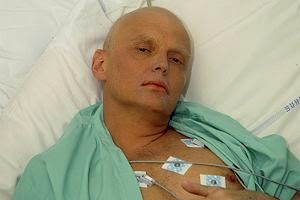họ cho biết Polonium là chất phóng xạ chỉ có ở Nga không màu sắt ,cực độc và không thể khám phá tại phi truờng do 3 tên giết nguời Andre Lugawolt,Dimitri Kovtun và Jaloslav Sokolenko ,3 tên này thuộc tổ chức mật vụ FSB( hãu thân cuả KGB)những tên này đã giết chết Litwinenko ,dấu vết cuả chúng còn sót lại trên máy bay khi chúng bay từ Moscow-Hamburg và London ,vì họ đã mở các hủ chứa Polonium để kiểm soát chúng nên trên máy bay đầy dấu vết cuả chất độc này cũng như trong khách sạn Milleniumvà tại tư gia cuả ông ở Luân Đôn! sau đó họ giảo nghiệm thi hài cuả ông và cho biết ông bị ám sát 2 lần: một lần trong khách sạn khi ông uống nhằm trong bar ở Hotel và lần thứ 2 ở tại phòng cuả ông ;sau đó ông duợc an táng trong một quan tài đuợc bảo vệ chống phóng xạ !
Boris Abramowitsch Beresowski nguời đã họp báo tại London lên tiếng tố cáo chế độ độc tài cuả tên mật vụ Putin, bạn cuả Litwinenlo cũng bị ám hại giết chết năm 2013 !
tài liệu cuả Wikipedia:!
Alexander Litvinenko
From Wikipedia, the free encyclopedia
This name uses Eastern Slavic naming customs; the patronymic is Valterovich and the family name is Litvinenko.
| Alexander Litvinenko Александр Литвиненко |
|
|---|---|
 |
|
| Allegiance | |
| Service | MI6,[1] KGB, FSB (defected) |
| Birth name | Alexander Valterovich Litvinenko |
| Born | 30 August 1962 Voronezh, Russian SFSR, Soviet Union |
| Died | 23 November 2006 (aged 44) London, United Kingdom |
| Cause of death |
Radiation poisoning |
| Nationality | Russian, British (2006 – his death) |
During his time in London, Litvinenko wrote two books, Blowing Up Russia: Terror from Within and Lubyanka Criminal Group, wherein he accused the Russian secret services of staging the Russian apartment bombings and other terrorism acts in an effort to bring Vladimir Putin to power. He also accused Putin of ordering the murder in October 2006 of the Russian journalist Anna Politkovskaya.
On 1 November 2006, Litvinenko suddenly fell ill and was hospitalised in what was established as a case of poisoning by radioactive polonium-210 which resulted in his death on 23 November. He became the first known victim of lethal Polonium 210-induced acute radiation syndrome.[6] The events leading up to this are a matter of controversy, spawning numerous theories relating to his poisoning and death. A British murder investigation pointed to Andrey Lugovoy, a member of Russia's Federal Protective Service, as the prime suspect. Britain demanded that Lugovoy be extradited, which is against the Constitution of Russia, which directly prohibits[7] extradition of Russian citizens without handing Russia any evidence related to the case. Russia denied the extradition, leading to the cooling of relations between Russia and the United Kingdom.
After Litvinenko's death, his widow, Marina, pursued a vigorous campaign on behalf of her husband through the Litvinenko Justice Foundation. In October 2011, she won the right for an inquest into her husband's death to be conducted by a coroner in London; the inquest was repeatedly set back by issues relating to examinable evidence.[8] A public enquiry began on 27 January 2015.[9]

